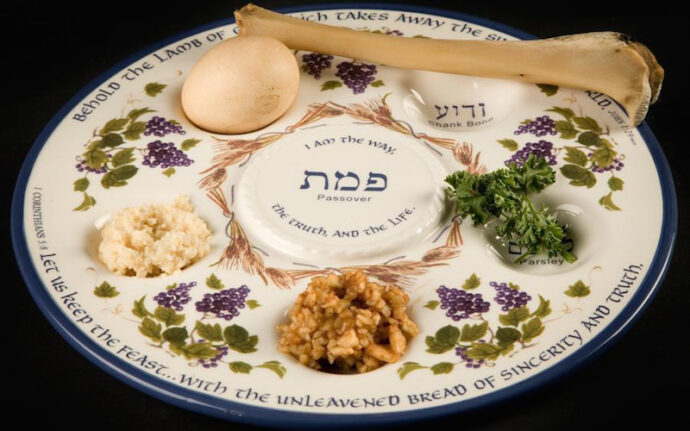The following essay launched a spirited debate, both on RD and across several other publications and platforms. Read the RD responses here. – eds.
I recently moved back to my hometown: a western suburb of Chicago that borders a town that is home to one of the largest and most influential evangelical Christian colleges in the country. As with most college towns, graduates often settle nearby. This makes my neighborhood a hub for evangelicalism and means that my neighbors tend to have followed the injunctions of their pastors to “keep themselves pure” from culture that is not specifically Christian. Even if folks didn’t attend Wheaton themselves, the school’s values permeate local culture. Add to this a simple demographic isolation and overall, my neighbors tend not to have had much exposure to cultures other than their own.
When people learn that, as a lifelong and practicing Christian, I am married to a Jewish man and that we practice both religions in our house, I often become the safe person to ask about Judaism. I like this advocate role for the opportunity it gives me to gently encourage folks to look at ways in which their privilege as a member of a majority population can sometimes cause them to cause offense.
Several times, I have encountered folks who wanted to host their own Passover seders. Their logic is that since Jesus was celebrating Pesach during the week when he was arrested, tried, executed and resurrected, in a desire to be more Christ-like, they too should celebrate the holiday.
Christians may desire to become more Christ-like or to develop deeper understanding of Christian roots, but hosting a Jewish Passover outside of the context of Jewish relationships does more harm than good. Christians celebrating their own Passover do unwitting harm to the Jewish people because they ignore centuries of persecution of Jews—and they do harm to themselves by ignoring their real-life Jewish neighbors, treating them as relics rather than people.
3,500 years of persecution, much of it by Christians, is not negated by the relative freedom from discrimination that Jews in America have experienced in recent decades. The horrific fear that so many Jewish people have felt cannot be understated. From Easter traditions that involved hunting down Jews to pogroms to ghettos to the Spanish Inquisition to the Holocaust, history is rife with this violent legacy.
Christians mounting their own reading of the Haggadah almost always want to discuss how Jesus is like the paschal lamb, using the occasion to show how all the Hebrew scriptures point to Jesus as fulfilling the prophecies. This theological exercise, known as supersessionism, is problematic enough in a purely Christian context, but as part of a Jewish ritual it is deeply out of place.
Spinning the “Old Testament” this way reduces the prophecies, the ambiguities that Jewish scholars have debated for centuries in the Talmud and in yeshivas, the morals derived from stories of flawed protagonists and, in fact, the entire narrative arc of the Jewish people as simply a preamble to the main act. Because Jewish people do not believe this interpretation of their holy texts and given the atrocities committed by members of our own faith because of this difference in belief, it’s like adding salt to the wounds of history for a Christian family to take one of the most sacred Jewish celebrations and twist it to reflect our own beliefs.
Christian families hosting seders is also problematic because it contributes to the objectification of our Jewish neighbors. Too often we conveniently forget that in 2,000 years, Judaism has changed quite a bit from what we read about in Acts. (For instance, although Jesus would have celebrated Passover, he did not celebrate it with the type of seder that is commonly hosted today.) And any knowledge we gain of ancient Judaism does not translate automatically to knowledge of modern-day Jewish people.
So, we come to equate “Jewish” in our minds with dudes in robes and scarfed women carrying baskets and we miss out on true community. Mimicking modern Jewish people by performing their ritual only continues this trend of objectification. And I might add, on a pastoral note, that once we lose sight of other human beings as children of God, we have missed the boat entirely.
What to do, then, if you are a Christian who wants to be more like Christ, as well as to learn more about your cultural roots? Practice restraint. One of the privileges that comes with being part of the majority culture is that nobody is likely to call you out on your cultural appropriation. So, call yourself out. Don’t host a seder. Not even if you only invite other Christians. Especially not if you only invite other Christians.
The modern Passover ritual that Jewish people share is rich in echoes of tradition. It rings hollow if not observed along with folks who have been layering the ceremony with meaning year after year.
It is possible to study the celebration of Passover as a Christian spiritual group if it is done with respect and knowledge. My own church hosts a Mediterranean potluck with hummus, pitas, falafel, and we read the Passover story from the Bible, look at haggadot of all types and discuss the elements—but do not actually go through the ritual of the seder.
We leave speculation of which prophecies Jesus fulfilled for a different time and focus on the themes of Passover, like our obligation to liberate others who are being oppressed. By making new traditions that grow out of our identity as Christians, rather than altering a Jewish ritual to make it fit our needs, pretending that it is ancient and therefore ours, we can celebrate Passover in the spirit it was intended.
We become better people if we honor Jewish folks in their Jewishness.
If you are lucky enough to have Jewish friends or family, and are invited to a seder, you may find that sitting as a minority amongst a table full of people who are part of a community that has celebrated Passover for hundreds of years, many of whom have eaten these foods every year since they were born—and with individuals who look forward to this holy feast with the same anticipation many of us feel for Christmas—you will sing Dayenu and feel that truly, the blessings that God has extended to you are enough and you do not need more.





